Beijing Geriatric Hospital: Guarding the Late Scene of Life in the Name of Life
On October 9, 2024, the General Office of the National Health Commission, the General Office of the Ministry of Education, the General Department of the National Bureau of Traditional Chinese Medicine, and the General Department of the National Disease Control and Prevention Bureau jointly issued the "Action Plan for Improving Medical Humanistic Care (2024-2027)" (hereinafter referred to as the "Action Plan") notice. The "action plan" requires that in order to improve patients' sense of access to medical treatment and satisfaction as the goal, with "mutual respect, privacy protection, strict compliance with laws and regulations, strengthen communication" as the core principle, adhere to the "patient-centered", vigorously carry out medical humanistic education, strengthen medical humanistic care, enhance doctor-patient exchanges and mutual trust, and build a harmonious doctor-patient relationship.
Previously, the reporter learned that because the vast majority of patients in Beijing Geriatric Hospital belong to the elderly group, they pay particular attention to the construction of medical humanistic care, and have formed a unique humanistic and Chunhui hospital cultural characteristics.
On October 15, six days after the "Action Plan" was promulgated, the "Central Media Hospital Tour" interview research group composed of more than 10 journalists from the People's Daily, Xinhua News Agency, Health Daily and other media went into the Beijing Geriatric Hospital and conducted in-depth interviews on topics such as "Hospital humanistic care" and "discipline construction of geriatric medicine".
 Chen Xingde, Party secretary of Beijing Geriatric Hospital, introduced the situation of the hospital at the symposium
Chen Xingde, Party secretary of Beijing Geriatric Hospital, introduced the situation of the hospital at the symposium
He initiated the concept of "elderly friendly hospital"
As the first three-level comprehensive medical institution featuring geriatric medicine in China, Beijing Geriatric Hospital, which is the same age as the Republic of China, ushered in its 75th birthday on October 18. As soon as the reporter entered the Beijing Geriatric Hospital, he noticed that on the street signs hanging on both sides of the road in the hospital, the notices of "Seventy-fifth anniversary of the establishment of the Beijing Geriatric Hospital" and "Geriatric Academic Week" were very eye-catching. Under the red and green street signs, the elegant hospital environment shows a rich festive atmosphere.
"This is the lucky ambassador 'Frova' designed for the 75th anniversary of the Institute." During an interview in the urology department of the hospital, Jin Lianchao, director of the department, pointed to a cartoon deer painted on the cultural wall of the department with its head held high and its silly demeanor and said: "We give the warm meaning of 'all the way (deer) accompanied' to the lucky ambassador 'Fuluva', which symbolizes the practice concept of our hospital to wholeheartedly protect the health of patients and accompany patients throughout their lives with love and responsibility." Jin Lianchhao also stressed: "The deer animal, in our traditional culture, has the meaning of kindness, happiness and peace, which is also in line with our hospital has been advocating the 'friendly culture' very much."
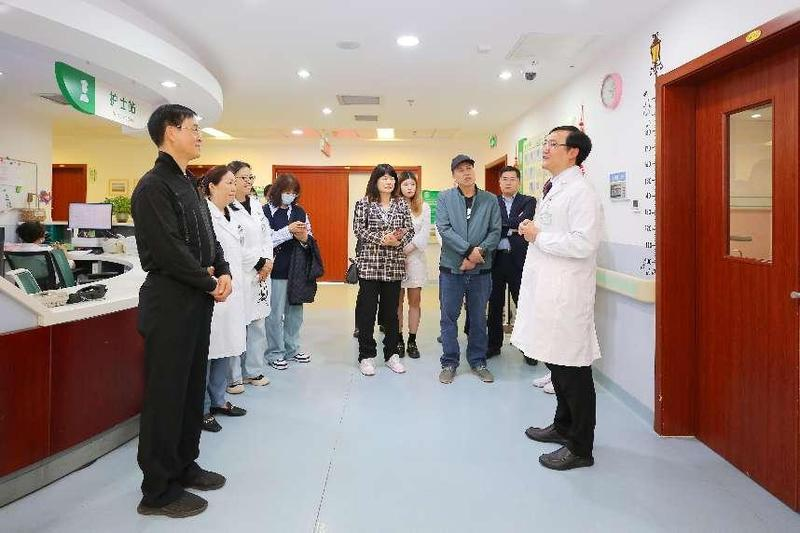 Professor Jin Lianchao (right), director of urology department of Beijing Geriatric Hospital, introduces the development of the department to reporters
Professor Jin Lianchao (right), director of urology department of Beijing Geriatric Hospital, introduces the development of the department to reporters
At the subsequent symposium, Chen Xingde, secretary of the Party Committee of Beijing Geriatric Hospital, talked about the origin of the hospital's "friendly culture" when introducing the hospital's situation. He said: "The concept of creating an 'age-friendly hospital' was first proposed by our hospital back in 2015. To this end, the hospital formulated the "Beijing Geriatric Hospital to create an" elderly friendly Hospital "implementation plan, proposed the framework and construction standards for the establishment of an elderly friendly hospital, and took a variety of measures to implement the work details of each employee. As soon as we proposed it, it struck a strong chord in the health care community, and the concept of 'building an age-friendly hospital' quickly spread across the city." Chen Xingde said that in recent years, the Beijing Municipal Health Commission, the Office of the Working Committee on Aging and other departments have jointly launched the construction of elderly friendly medical institutions, focusing on the four aspects of friendly culture, service, environment and management to optimize the medical experience of the elderly. Not long ago, on September 25, at the Beijing Municipal Government Information Office held a special press conference on the development and achievement of Beijing's aging cause, it was revealed that as of now, 595 medical institutions in the city have been successfully created as age-friendly medical institutions, accounting for 98.7%.
Chen Xingde said that the two words "friendly" are the concentrated embodiment of the connotation of humanistic care construction in medical institutions. Not only medical institutions, but also the social significance of humanistic care is very important. From the national level, China has entered the stage of population aging, and the aging problem will become more and more serious. Caring for the physical and mental health of the elderly is an urgent issue that the whole society should pay attention to, which is an important symbol of social civilization and progress. From the social level, our nation has the traditional virtue of respecting the elderly, respecting the elderly, and caring for the elderly. The elderly have made significant contributions to national construction and national progress, and should be respected and cared for by the whole society. From the family level, the culture of filial piety in traditional culture is one of the basic emotional elements to maintain the existence and continuation of our families for thousands of years. On a personal level, parents give us life, feed and teach us to grow up, so children should cherish, be grateful and honor their parents, and fulfill the responsibility of supporting their parents when they are old. When it comes to health workers, at home, we are our parents' children; In the workplace, we are the younger generation of the elderly. Therefore, the friendly culture advocated by Beijing Geriatric Hospital is in line with the culture of filial piety that has been passed down for thousands of years. This is a unique and distinct characteristic of the construction of humanistic care in hospitals. Beijing Geriatric Hospital will adhere to the practice principle of "satisfying patients is our eternal pursuit", and continue to enrich the unique connotation of the hospital's humanistic care concept by building a friendly culture.
Medical humanistic care is a kind of belief
In the in-depth interview of the department of neurology, cardiac rehabilitation ward, urology, rehabilitation center and other departments, the reporter found that the cultural elements of humanistic care in the Beijing Geriatric Hospital have been included in many details of the medical environment and medical work.
Zhang Zhiyong, director of the Department of Neurology, is the discipline leader of the Beijing Geriatric Hospital Branch Center of Neurointerventional Construction under the National Health Commission. He is an authoritative expert in the field of endovascular minimally invasive surgery for various cerebrovascular diseases. Yang Yingna, director of the publicity center of the hospital, told reporters that Director Zhang Zhiyong has to do thousands of minimally invasive interventional operations every year, and has done more than 8,000 minimally invasive interventional operations so far.
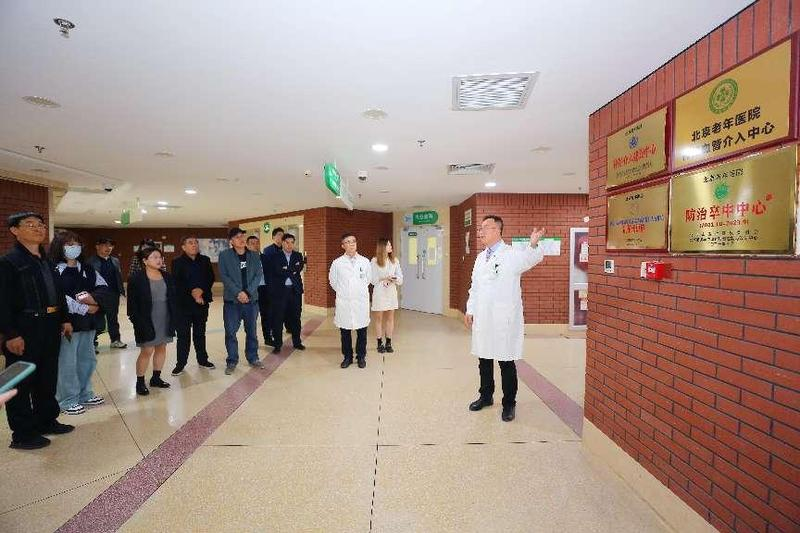 Professor Zhang Zhiyong, director of neurology Department of Beijing Geriatric Hospital, introduced the construction of the discipline to reporters
Professor Zhang Zhiyong, director of neurology Department of Beijing Geriatric Hospital, introduced the construction of the discipline to reporters
"Something like that." Professor Zhang Zhiyong said, "Tomorrow, we will arrange more than 20 surgeries. It's very common. It's not unusual to stay until 10 or 11 at night." Later, he told reporters about his department's unique "sky rail system." "Many patients in neurology lose the ability to take care of themselves. This sky-rail system, through the tracks installed on the ceiling of each place in the department and ward, can realize the barrier-free automatic transfer of patients from beds to toilets and rehabilitation treatment areas, greatly convenient inpatients with mobility difficulties, and can assist patients to carry out bathing, toilet and other life needs. It can also assist patients in rehabilitation exercises and treatments such as standing up exercises and independent gait walking exercises." Director Zhang Zhiyong said that this "sky rail system" was introduced by the hospital in 2015, and it is also the first medical institution in Beijing to introduce similar facilities. It not only facilitates tens of millions of patients, provides better protection for the medical work of the department, but also reflects the concrete measures of Beijing Geriatric Hospital to pay attention to humanistic care from the hardware construction.
 Yang Yingna, director of the geriatric Hospital Publicity Center, introduced the 75-year history of the hospital to reporters
Yang Yingna, director of the geriatric Hospital Publicity Center, introduced the 75-year history of the hospital to reporters
In the interview, the reporter found that in the corridors of the neurology department, cardiac rehabilitation ward, urology department and other departments of the Beijing Geriatric Hospital, doctors' offices, nurses' stations, wards and other Spaces, exquisite "wish cards" were made, illustrated and popular science knowledge, and lively style of various "warm tips" with the nature of "doctor's orders". In the neurology department, information boxes decorated with pamphlets hung on the wall and were arranged in beautiful patterns; In the cognitive disorder diagnosis and treatment center, Teresa Teng's posters, food stamps in distant memory, posters from the Red era, rickshaws from old Beijing, bicycles with 28 bars... A nostalgic photo constitutes a corridor of time memory in the corridor, in order to awaken the memory of patients with cognitive impairment...
"This hospital, whether it's a treatment area or an inpatient area, is not like a hospital. It's more like a community center for the elderly." After interviewing and visiting the hospital, one reporter lamented.
Luo Zhi, deputy director of the cardiac rehabilitation Ward, said that humanistic care is not only a concept, but also a yardstick to test the responsibility of medical staff. Decorate the wall, arrange the ward, tidy up the office, so that the original cold environment of the hospital seems warm, these seem to have little to do with the work of doctors and nurses, in fact, it can reflect the overall quality of a department team.
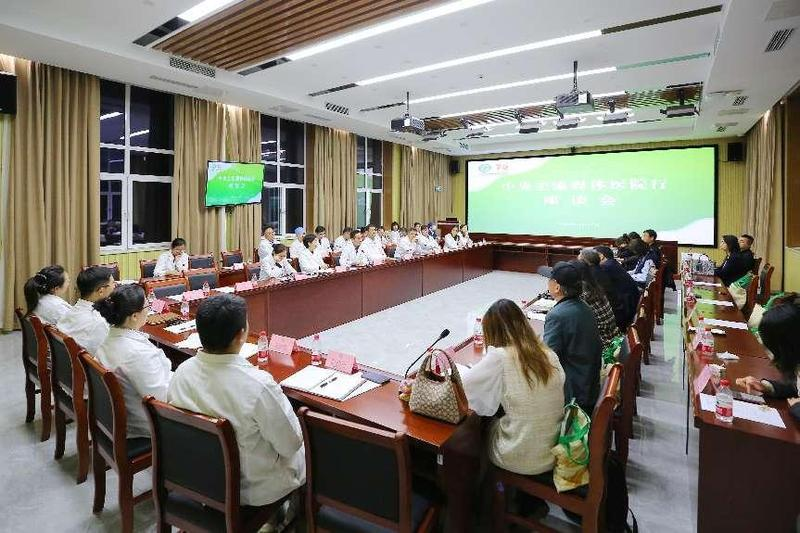 Forum site
Forum site
"When patients come to our hospital, we not only treat their physical diseases, but also pay more attention to the psychological problems of patients." Technology and humanity are the two wings of geriatric medicine, both indispensable. In fact, geriatric hospitals also pay more attention to the patient-centered medical humanistic spirit. From the perspective of hospital culture, medical humanistic care has almost become a belief of geriatric medicine workers. In the name of life, we uphold the feelings of doctors who guard the evening scene of patients' lives, and consolidate and enrich the spiritual edifice of humanistic care in our hospital. This work is solid, not only can really solve the worries for patients and patients' families, but also a wonderful reflection of the personal value and professional value of our medical workers..." At the symposium, when talking about the "Action Plan", Secretary Chen Xingde elaborated that "the key to the implementation of the" action Plan "is the word" promotion ". Every hospital is doing humanistic care work, how to improve on the basis of the original? This is the core of this "action plan", and it is also a new topic facing our hospital. In the next step, we will take the opportunity of the 75th anniversary of the establishment of the hospital, from the aspects of publicity and agitation, organization construction, staff training, environment construction, etc. to closely combine the concept of medical humanistic care, recognition and practice with the construction of medical ethics, and then on the basis of the characteristics of the hospital's 'friendly culture', let the medical humanistic construction work to a higher level."
Hospice, giving life its last dignity and warmth
October 12 marks the 20th World Day for Palliative Care. The theme of the event is "Look and Share: Ten Years of Peace and Detente resolutions". The "palliative care Resolution" here refers to the "Resolution 67.19" adopted by the World Health Assembly 10 years ago in 2014, entitled "Strengthening palliative care as an integral part of comprehensive care throughout the life Course", which for the first time called on all countries to strengthen palliative care and ensure its availability. It also provides important guidance and support for the development of global palliative care ?.
In view of the above background, the "Central Media Go grassroots" reporter interview research team focused on interviewing the hospice care center of Beijing Geriatric Hospital. Cao Feng, director of the hospice Care Center, first introduced: "The concept of hospice care originated in the United Kingdom, and in the late 1980s, the concept of hospice care was introduced to China. The hospice unit of our hospital was established in May 2010, which is the first medical institution in Beijing area to establish hospice unit in a public tertiary hospital, and also the first hospice demonstration base in Beijing. Hospice services have been rolled out across the country. "Hospice care is also called hospice care, palliative care, palliative care, and these different names all mean the same thing."
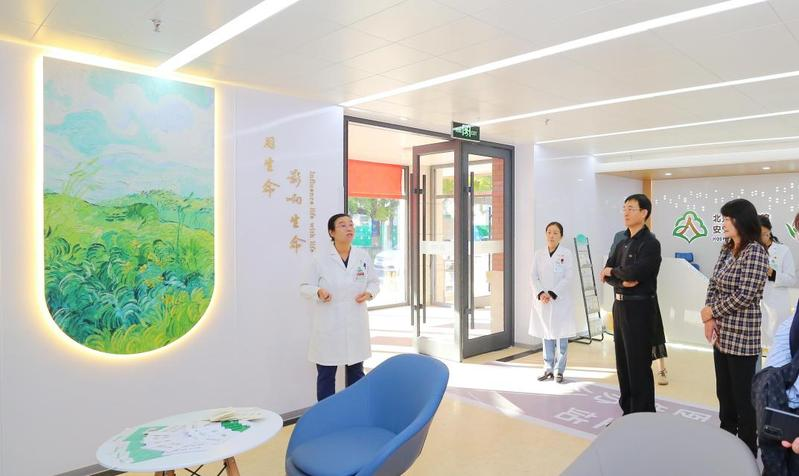 Cao Feng (left), director of the hospice Care Center of Beijing Geriatric Hospital, explains the meaning of the painting to reporters
Cao Feng (left), director of the hospice Care Center of Beijing Geriatric Hospital, explains the meaning of the painting to reporters
In the hospice center, the reporter saw that from the corridor to the ward, there was a strong atmosphere of respect for life and protection of life. In the activity room, on the front wall is an oil painting by Monet. Cao Feng explained: "In this painting by Monet, there is green grass below and sky above. Through this painting, we hope to convey the concept of respecting life and advocating nature. We hope that patients can realize that people will naturally age and die naturally, rather than deliberately taking unnecessary medical treatment measures at the last moment of life to forcibly prolong life and let patients leave this world in pain."
Cao Feng then introduced the reporter to some of the respected domestic and foreign pioneers in the field of hospice, and then took the reporter to a room called "Talking Ventricle". The reporter saw that the room was very warm. "At the end of life, when the patient enters the emergency room, the patient's own wishes are no longer important. In general, most of the decisions between then and death are made by the family. As a medical institution, we sometimes need to discuss with patients and their families to make an individualized treatment opinion or treatment decision for patients, so we have specially set up this "talk chamber". This is the characteristic measure of humanistic care in our hospital. This can be a place for family meetings, or we can gather the relatives of the patients to discuss the treatment plan together, or listen to their treatment requirements, so as to reach a consensus, and then fully patient-centered, with the needs of the patients as the purpose, to develop a suitable treatment plan, and finally implement the patient." Cao Feng said.
Cao Feng said that the concept of hospice care and palliative medicine, many patients' families are affected by the filial piety of traditional culture, hoping to save the lives of the elderly as much as possible with a cavity of filial piety, at any cost. As a medical worker, I fully understand and respect this, but medicine cannot solve all problems. In the face of incurable diseases, all measures to forcibly prolong life have been meaningless, many treatment measures, especially invasive treatment, often bring a lot of unnecessary pain to patients. At this time, the patients and their families need more help and comfort. Therefore, we pay special attention to the work of patients' living wills, and strongly advocate that patients voluntarily sign living wills when they are fully conscious. Decide which treatments to refuse, but this does not mean giving up treatment and care. "We, as medical personnel, will certainly first make a very careful and serious assessment of the patient's life status, and then in this' talk about the ventricle ', seriously tell the doctor's opinion to the family." Therefore, this "talking about the ventricle" bears many missions of medical humanistic care in our department. Many patients or patients' families, always feel that there will be a lot of regrets in people's lives, and there must be some words that can not be said at ordinary times, unable to express some emotions in the past, hope that before the end of life, finally be able to express it, leave no regrets, let the deceased leave safely. This' talk ventricle 'is an extremely private space, and it can also let patients or their families have a lot of thoughts." Cao Feng said.
At the symposium, Cao Feng introduced again, "As a department with the most distinctive characteristics of humanistic care, as a flag for hospice care in the capital area, from the requirements of medical humanistic care, our department has its own complete set of hospice humanistic concept." We summarize this set of ideas as "one heart, two minds, three virtues, four paths, five safety, six integrity." One heart is "patient-centered"; The second meaning is "to meet the patient's will, in line with the family's will"; Three good, that is, "good death of the deceased, good life of the survivors, good parting of relatives and friends"; The four ways are "love, thank you, apologize, and say goodbye"; Five security, is' peace of mind, serene, peaceful, comfortable, settled '; Six full, that is, "the whole person, the whole family, the whole team, the whole community, the whole heart." The "whole person" refers to the whole person health care model, including physical, psychological, social and spiritual four aspects; 'The whole family' means the patient and his or her family; "Whole course" refers to the whole cycle of the disease; 'Whole team' refers to the multidisciplinary medical team; 'Whole community', which means mobilizing social participation; 'Whole-hearted' refers to the love, care, patience and perseverance of medical staff."
Cao Feng said, "Our 'Hospice humanistic concept' is a systematic summary of our hospital's unique medical humanistic care. Our colleagues in the hospice center, with gratitude and respect for life, follow this humanistic concept every day, and protect the dignity of one life before the end of the curtain, bringing the last warmth to their lives..."
Secretary Chen Xingde introduced at the symposium: "Our hospital has the advantages of geriatric medicine, these advantages are concentrated in providing the elderly with 'all-round, full-cycle, integrated' elderly medical and health services. "Full range, full cycle", is to provide a full range of medical services for the entire life cycle of patients, including hospice care. Therefore, the hospice center in our hospital is a more distinctive department in our hospital. The focus of the work of this department is not to extend the survival period of patients as the purpose, but to focus on the quality of life, reduce various painful symptoms, maintain the dignity and value of life of patients and their families, change the outdated concept that extending the life cycle is the highest standard of medical treatment, and reflect the respect of medical workers for human life rights. Because it is involved in the medical work of people's last life course, hospice care can more typically reflect the characteristics of medical humanistic care in medical institutions, and is also the ultimate care for life of medical workers. In terms of hospice care, our hospital ranks at the forefront of the discipline construction in Beijing, and is also the national hospice care demonstration and education base of the China Life Care Association."
We look forward to the early introduction of basic standards for geriatric hospitals at the national level
Yu Zhen, president of Beijing Geriatric Hospital, introduced the scientific research work of the hospital at the symposium and said: "The research feature of Beijing Geriatric Hospital is geriatric medicine. Geriatric medicine is a relatively new subject, many hospital departments are born from the "cadres health department" of geriatric medicine. Although the discipline is relatively new, in recent years, due to the aggravation of the aging trend in China, the importance of the geriatric department has gradually emerged, and the geriatric department set up in hospitals across the country has shown an explosive growth trend. Our hospital has a unique advantage in geriatric research, and has set up the Research Office of Geriatric Health and the Combination of Medical and Nursing Care in Beijing Geriatric Hospital, which undertakes the related tasks of the Beijing Institute of Geriatrics of Integrated Chinese and Western Medicine and the Beijing Geriatric Health and Medical and Nursing Service Guidance Center."
"Gerontosis is a comorbidity. The goal of the treatment of geriatric diseases is often not to cure, but to improve the quality of life of the elderly on the basis of geriatric diseases. The research focus of geriatric medicine mainly focuses on the functional rehabilitation of elderly patients, which also leads to the difference between our hospital and other hospitals in the whole medical index system. Our geriatric clinical research focuses on Alzheimer's disease, neurology, cardiology, rehabilitation medicine, hospice care, and so on, which is the nature of our hospital." Yu Zhen said.
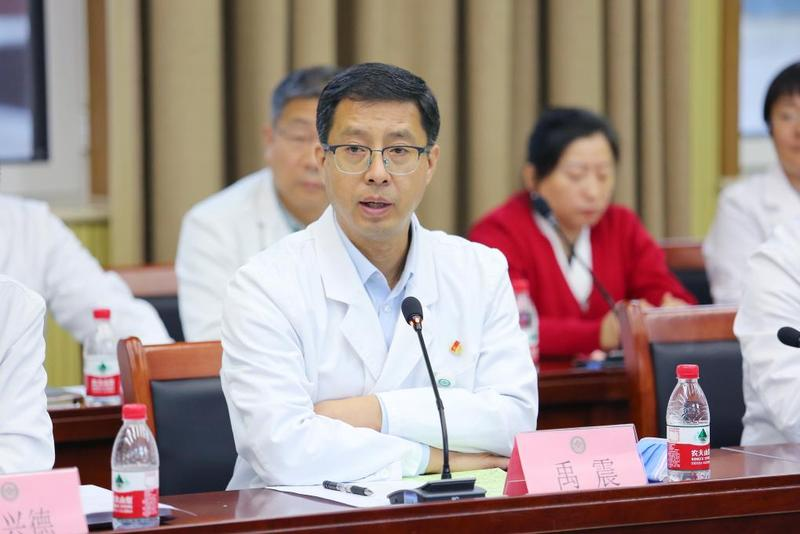 Yu Zhen, president of Beijing Geriatric Hospital, introduced the achievements of the construction of geriatric medicine in the hospital at the symposium
Yu Zhen, president of Beijing Geriatric Hospital, introduced the achievements of the construction of geriatric medicine in the hospital at the symposium
It is understood that Beijing Geriatric Hospital is the first third-level geriatric hospital in the country, so it has a strong advantage in participating in the formulation of many normative documents in the field of geriatric diseases by relevant departments. In recent years, The hospital's experts Yu Zhen, Song Yuetao, Lv Jihui, Ma Zongjuan, Li Baoying, Cao Feng and other experts have participated in the formulation of more than 10 industry norms such as "geriatric health and geriatric service terminology", "Technical Specifications for the assessment of geriatric friendly hospitals", "care service specifications for the elderly with cognitive impairment", and "Standard for the elderly in the combination of medical and nursing institutions to transfer beds between the elderly and the medical area". And participated in the national vocational skills standard - "the ability of the elderly Evaluator" review work. It has also published 32 medical or popular science monographs, such as the Guide to the Construction of Geriatric Friendly Medical Institutions Based on Comprehensive Evaluation, the Blue Book on the Development of Chinese Geriatric Hospitals (2024), the Popular Science Book Series on the Health of the Elderly, and the Manual on the Diagnosis and Treatment of Geriatric Diseases.
Although the Beijing Geriatric Hospital has made many achievements in discipline construction, personnel training, clinical research and other aspects, Yu Zhen said that the discipline construction of the Beijing Geriatric Hospital is still in a state of "crossing the river by feeling the stones" at many levels, and similar hospitals in the country are generally so, because we have not yet introduced a national level "basic standards for geriatric hospitals".
Yu Zhen elaborated: "According to incomplete statistics, by the end of 2022, the number of geriatric hospitals in China has reached 3,062; Among them, there are 439 third-level geriatric hospitals, 1,195 second-level geriatric hospitals, 744 first-level geriatric hospitals, and the remaining 684 are ungraded hospitals. Therefore, it is urgent to introduce basic standards for geriatric hospitals at the national level."
Yu Zhen further explained that the reason for saying "imminent" has four reasons: First, the situation is forced. At present, China has entered a moderately aging society, and in the next period, the elderly population will increase sharply. The health problems of the elderly are related to the long-term stability of the country, and the active response to the aging population has also risen to the national strategy. Second, the assessment method applied to general hospitals is seriously unfair to geriatric hospitals. Geriatric hospitals should be located in specialized hospitals. The objects of geriatric hospital should be elderly patients with aging, multi-disease coexistence, multi-drug use, multi-organ failure, multi-system dysfunction, a variety of geriatric syndromes, and a variety of geriatric care problems. But at present, geriatric hospitals are mostly located in general hospitals. In the national ranking of scientific and technological values, geriatric hospitals and other general hospitals are measured by the same standard, and these indicators are significantly higher than other general hospitals in terms of average length of stay, average hospitalization cost, drug proportion and mortality. This kind of assessment standard is seriously unfair to geriatric hospitals, and the assessment method is extremely unreasonable, which seriously discourages the enthusiasm and innovation of geriatric medicine workers, and seriously affects the training and introduction of high-quality geriatric medicine talents. Third, the service nature of geriatric department is different between geriatric hospital and comprehensive hospital. Although many general hospitals have set up the geriatric medicine department, the geriatric medicine department mainly solves the acute medical problems of the elderly, and the geriatric hospital provides comprehensive, continuous and integrated services covering the health promotion, preventive health care, chronic disease prevention and control, acute medical treatment, medium-term rehabilitation, long-term care, hospice care and the combination of medical and nursing care for the elderly. Fourth, several documents at the national level mentioned the construction of geriatric hospitals. The concept of geriatric hospital first appeared in the Opinions on Strengthening China's Geriatric Medical and Health Work issued by the former Ministry of Health on January 26, 1985, and then in the Opinions on Promoting the Development of health Service industry issued by The State Council in 2013. In the Notice on Printing and Distributing the Outline of the National Medical and Health Service System Planning 2015-2020 issued by The General Office of the State Council in 2015, and in the Opinions of the Central Committee of the Communist Party of China and The State Council on Strengthening the Work on Aging in the New Era in 2021, In 2021, The State Council's Notice on the issuance of the "14th Five-Year Plan" National Aging Cause Development and elderly care Service System Planning, and in 2022, the National Health and Health Commission's Notice on the issuance of the "14th Five-Year Plan" Healthy aging Plan, both mentioned strengthening the construction of geriatric hospitals and rationally distributing elderly care institutions and geriatric hospitals.
 Give life the last dignity and warmth
Give life the last dignity and warmth
According to Yu Zhen, there are local standards for geriatric hospitals in Jiangsu, Heilongjiang, Henan, Shandong, Jiangxi and other provinces, the Chinese Geriatric Society has also issued the "Basic requirements for Geriatric hospital construction" group standards in 2023, and the National Health Commission will also issue the "general hospital to add geriatric hospital name standard" industry standards.
"At present, some provinces and cities, including Beijing, due to the lack of basic standards for geriatric hospitals at the local and national levels, institutions originally named geriatric hospitals have been forced to change their names to rehabilitation hospitals, nursing homes, integrated traditional Chinese and Western medicine hospitals, etc." There is no basic standard for geriatric hospitals at the national level, which seriously restricts the rapid development of geriatric medicine." Yu Zhen said: "The establishment and implementation of the national geriatric hospital standards is an important part of the construction of the geriatric health service system, is an important action to actively respond to the aging population, and is a necessary measure to implement the relevant policies of the Party Central Committee and The State Council." As a representative medical institution in the industry, we at Beijing Geriatric Hospital look forward to this day as soon as possible."

